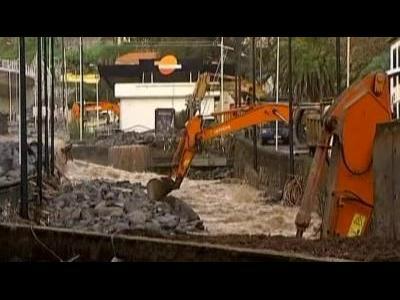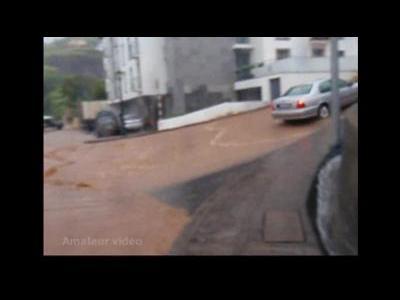FUNCHAL, Madeira Islands – Emergency crews used sniffer dogs Monday to search through huge piles of debris for at least four people still missing in Madeira after flash floods and rockslides killed 42 people on the Portuguese vacation island.
The dogs scoured heaps of boulders, broken trees and other debris blocking streets. Rescue teams dug cars out of head-high mounds of sludge to see if there was anyone inside.
Crews pumped rainwater and mud out of a shopping mall'sunderground parking lot in the capital, Funchal, where officials fear more bodies may be found. The parking lot's two levels were completely submerged.
Flash foods gathered speed during Saturday's storm as rainwater crashed down steep-sided slopes, heaving tons of earth, boulders and trees against buildings and carrying away vehicles. Roads were washed away and bridges collapsed, shunting cars into the raging waters.
Officials said most victims appeared to have either drowned or were crushed.
Although only four people were officially unaccounted for Monday, officials said there could be more victims because blocked roads and downed phone lines made it difficult to get a complete picture of the damage.
Pedro Ramos, a spokesman for Funchal's main hospital, said his services had treated 151 injured people.
Meanwhile, authorities ordered the evacuation of some hamlets as showers raised fears of more landslides. Ankle-deep rainwater washed through Funchal's muddy streets.
Madeira island, with a population of more than 200,000, rises sharply to a central peak. Most large communities are in low-lying oceanside areas, while rural villages often cling to vertiginous escarpments.
Locals said the storm was the worst in memory. Officials said a month's worth of rain fell in about eight hours, unleashing a torrent of water and mud that swept away people, houses and vehicles.
In Ribeira Brava, a village at the foot of a valley about 15 kilometers (10 miles) from Funchal, Mayor Ismael Fernandes appealed for calm and urged people to stay put after residents started fleeing out of fear of a landslide.
Some houses and a clinic on the outskirts of Ribeira Brava were evacuated because of concerns that a hillside above the village could give way. When word of that order spread, people rushed to leave Ribeira Brava and traffic jams formed as cars lined up to get out.
Rescue teams in more than 400 vehicles, including bulldozers, worked through the night to clear tons of caked mud, boulders and snapped trees, authorities said.
"The recovery is going to be a hard work," resident Miguel Eduardo told Associated Press Television News. "It will take us a few months to recover."
Almost 120 people forced to leave their homes were staying at a military barracks, according to the regional government.
Several main roads remained blocked. Officials hoped to reopen all the island's roads by the end of the week.
Victims in white body bags were taken to Funchal's international airport, where a makeshift morgue was set up. Among the dead was a firefighter who was swept away as he tried to save a woman, his colleagues said.
The British Foreign office said one British national was killed and a few others had been hospitalized on Madeira. The island is popular with British tourists because of its mild climate.
Madeira is the main island of a Portuguese archipelago of the same name in the Atlantic Ocean just over 300 miles (480 kilometers) off the west coast of Africa.
The head of the regional government, Alberto Joao Jardim, told people to stay at home if they could Monday and schools canceled classes for 30,000 students.
The floods were so powerful they carved paths down mountains and ripped through the city, churning under some bridges and tearing others down.
"A woman came running and said the water is coming and then she started to run, and then we ran with her," Danish tourist Luna Graigsson told APTN. "It was astonishing that the water came so fast."
The Portuguese government was holding a special Cabinet meeting Monday and was expected to announce three days of mourning for the victims. It may also grant financial aid to rebuild Madeira's many destroyedroads and bridges.
The regional government says it has no estimate yet of its financial needs.
Portugal Telecom said 85 percent of the island's cellular and fixed-line capacity was restored by late Sunday.
Environmental groups alleged that building on natural water runoffs and the island's poor infrastructure management contributed to the disaster, but officials insisted it was impossible to prepare for such a freak deluge.
A Portuguese Navy frigate bringing troops to help with the cleanup was scheduled to dock in Funchal later Monday. A medical team with divers and rescue experts arrived Sunday aboard a military transport plane.
Light showers were forecast for the Atlantic Ocean island Monday and Tuesday.
___
Hatton reported from Lisbon, Portugal.
http://news.yahoo.com/s/ap/20100222/ap_on_re_eu/eu_portugal_landslides





Tidak ada komentar:
Posting Komentar